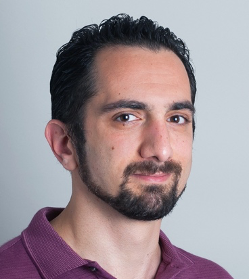Design for Manufacturing by Geometry- and Physics-based Reasoning
Speaker: Dr. Morad Behandish, Palo Alto Research Center (PARC), Xerox
Date: Dec 4, 2020; Time: 2:30pm Location: WebEx
 Webex Link: http://s.uconn.edu/meseminarf90
Webex Link: http://s.uconn.edu/meseminarf90
Abstract:
Modern additive and hybrid manufacturing capabilities provide enormous freedom to leverage by automated design tools (inverse problem solvers), while putting increasing demands on simulation and analysis tools to evaluate candidate designs for performance and manufacturability criteria (forward problem solvers). In this talk, I will present a framework for design optimization, manufacturability analysis, and manufacturing process planning to incorporate heterogeneous (kinematics- and physics-based) constraints imposed by both performance and manufacturability requirements. A key enabler of this framework is the ability to represent these constraints as spatial fields by their local violation measures that can be penalized in iterative optimization. These fields may be obtained by numerical physics simulation and spatial reasoning in configuration spaces of additive or subtractive tool motions, followed by registration filters to project them back to the Euclidean space, when applicable. The physics-based computations are commonly the bottleneck, especially for multi-physics problems with evolving geometric boundaries such as solid-liquid-gas interfaces in additive manufacturing. Moreover, manual construction of reduced-order solvers at various levels of granularity may take years of manual effort by computational experts. Towards the end of this talk, I will illustrate some of our more recent activities in automating the development of forward and inverse computational solvers and novel artificial intelligence (AI) techniques for producing physics-obeying models from simulation or experimental data.
Biographical Sketch:
Morad Behandish manages the Computational Design Area at Palo Alto Research Center (PARC) of Xerox. Over the past three years, he has been leading a research portfolio at the intersection of geometric modeling, physics, manufacturing, and computation. His main topics of interest are design for additive and subtractive manufacturing, physics-based process simulation, and development of geometry- and physics-aware representations and artificial intelligence (AI) tools in support of engineering applications. He has been leading successful execution of three projects in DARPA AI Research Associate (AIRA) and DARPA Computable Models (in collaboration with Stanford) programs and contributed to the development of new programs at DARPA. He has also made significant contributions to DARPA Transformative Design and DARPA Fundamentals of Design programs as well as commercial projects for Xerox 3D printing and Sandvik machining solutions. Prior to joining PARC, Morad was a Postdoctoral Fellow at the International Computer Science Institute (ICSI) of UC Berkeley. He received his Ph.D. from UConn in 2016 in Mechanical Engineering and has a Master’s degree in Computer Science and Engineering, both advised by Prof. Horea Ilieş.